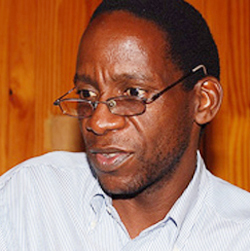Prosecutor General, Johannes Tomana, was earlier this week arrested after charges were dropped against two suspects accused of trying to bomb a dairy firm owned by President Robert Mugabe’s family.
Tomana was bailed after being charged with criminal abuse of office.
Speaking to NewZimbabwe.com, Prof Maduku said if there was suspicion that Tomana had criminally abused his office, “the only recourse, in that circumstance, was for the President to appoint a tribunal.â€
Prof Madhuku said only a tribunal of that nature could determine whether or not, in the performance of Tomana’s duties, there was an improper abuse of office.
He also said it was premature “and therefore unconstitutional to arrest and charge a Prosecutor General Johannes for alleged acts of misconduct arising from the performance of his duties before invoking the procedures in the Constitution that deal with acts of misconduct by a person occupying that office.
“Section 260(1) of the Constitution is explicit that the Prosecutor- General ‘is independent and is not subject to the direction or control of anyone and must exercise his or her functions impartially and without fear, favour, prejudice or bias’.
“What this means, at law is that the Prosecutor General, while performing his duties, is allowed to make mistakes, commit errors of judgment or even abuse his office without answering to anyone, including the President.
“If anyone believes that the Prosecutor General has abused his office in the course of performing his duties to the extent of committing a criminal offence, the scheme of the Constitution is that the question of removing the Prosecutor General from office must first be
investigated by a tribunal provided for in the Constitution before any arrest and/or prosecution.
Constitution allows PG to err
“The logic of the Constitution is that only a tribunal of experts can scrutinise the decisions of the Prosecutor-General and determine whether there was a gross abuse of power warranting removal from office.â€
Madhuku, also an opposition politician, said there are two types of criminal offences that may be committed by a Prosecutor- General.
“The first set of offences is those not related to performance of his duties as a Prosecutor-General and these are offences where, in conducting himself in the manner that leads to allegations of criminal misconduct, the Prosecutor General cannot be said to be doing his job.
“And most of the offences are such as murder, bribery, negligent driving and so on. The second set of offences are those arising from his duties as a Prosecutor- General, such as where he abuses his/her office and corruptly favours a person or acts with bias.
“Here the Constitution protects him/her from immediate arrest. There is a long mandatory procedure that must be followed before an arrest no matter how serious the alleged criminal misconduct. This is because of sections 259 and 260 of the Constitution.â€
He added: “If the tribunal regards any abuse of power as not warranting removal from office, the Prosecutor-General must remain in office and cannot be arrested.
“In other words, where he/she is performing his duties whether properly or improperly, there are only two options: either he/she is in office and cannot be interfered with in any way or he/she is removed from office, thus paving way for an arrest or prosecution.â€
Madhuku said there was no room for the arrest and/or prosecution of a sitting Prosecutor-General in relation to the second set of offences (that is, those emanating from the performance of his/her duties).
“This places the Prosecutor-General in the same position as a judge,†he said.
“If a judge corruptly grants judgment in favour of a party in court proceedings, he/she cannot be arrested immediately merely because a police officer believes the court order came from an act of corruption.
“The law of Zimbabwe in relation to judges and the Prosecutor-General says if the alleged act of criminal misconduct is not arising in the course of performance of a duty, a judge or Prosecutor-General may be arrested, like any other person.
“In the case of the Prosecutor-General, the decision of whether or not to prosecute was his alone under the Constitution.â€
Madhuku, a lecturer at the University of Zimbabwe,  also said to avoid serious complications that would arise from what has already happened and to safeguard the rule of law “the President has no option but to appoint a tribunal under section 187 so that the Prosecutor-General is automatically suspended pending the outcome of the investigations by the tribunal.
“This would allow a clean way for the return of the Prosecutor-General to his office.â€
Post published in: Featured


